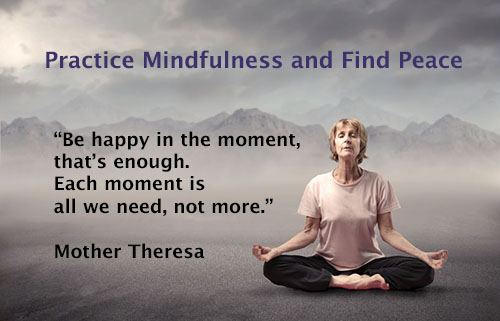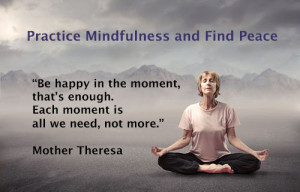

“Be happy in the moment, that’s enough. Each moment is all we need, not more.” ― Mother Teresa
Growing older is like stepping into the great unknown. Each day has the possibility of bringing great  success, tragedy, or just plain monotony. Many enter their golden years unsure, and scared of what the future may hold. As our bodies begin to age, losing the strength and tone it once had, with our hearing and eyesight beginning to fade, it’s easy to panic. Everything begins to change at an alarming pace, and so we begin the tireless search for the fountain of youth, something that will restore peace and calm in our life.
success, tragedy, or just plain monotony. Many enter their golden years unsure, and scared of what the future may hold. As our bodies begin to age, losing the strength and tone it once had, with our hearing and eyesight beginning to fade, it’s easy to panic. Everything begins to change at an alarming pace, and so we begin the tireless search for the fountain of youth, something that will restore peace and calm in our life.
We see it all around us, people using (and sometimes abusing) diet and exercise fads, anti-aging products, plastic surgery, “miracle” drugs and anything else that promises to slow the aging process. Instead of appreciating the serenity and wisdom that comes with growing older, many fall into a deep depression, and become jaded and pessimistic.
How do you stop yourself from being part of this vicious cycle? How can you learn to be happy, despite all the changes that are happening in your life?
Mindfulness.
Mindfulness is a concept that focuses on awareness and attention. Although it is derived from the Buddhist religion, psychologists have been using it since the 1970’s to help people suffering from a variety of psychological conditions, including anxiety, depression and stress.
There is a difference between practicing mindfulness vs. meditating. Meditating is a spiritual or relaxing mental exercise, such as focusing on breathing or chanting, whereas mindfulness is about being aware and attentive in a non-judgmental manner.
Mindfulness meditation is all about being aware of your surroundings, the feelings in your body, the noises you hear.
Basic meditation is the opposite. It’s purpose is to “zone out”, to let the mind release itself, giving your thoughts a rest. Mindful meditation is essentially the opposite of that, training your brain to focus and concentrate by “zoning in” on certain aspects of your life. By practicing mindfulness meditation, you can learn how to live in awareness, enjoying the benefit that sort of practice brings to the rest of your life.
One of the most interesting studies done on mindfulness in recent years showed that a simple 8-week mindful meditation program not only decreased loneliness in seniors, but also had a positive effect on the participants’ health.
Here are some of the positive benefits mindful meditation can have on you:
Practicing mindfulness can change the way you see the world. Instead of worrying about the future, or lamenting days gone by, you will find joy in the present moment, finding appreciation for everything around you. If you can, find and join a mindfulness program, or read on for some simple tips on how to practice mindfulness.
1. Make Time and Space
Find a time when you have 10 minutes to spare. Put away anything that may distract you, or find a place where you won’t be disturbed.
2. Acknowledge Your Thoughts
As you get settled, acknowledge, in a non-judgmental way, any thoughts that may arise. How do you feel about mindfulness? You may find yourself excited, scared, or skeptical even. Allow all thoughts to pass through your mind, acknowledge them, and then go back to making yourself comfortable
3. Focus on Your Breath
Close your eyes, and breathe in deeply through your nose. Feel the breath as it enters your body, traveling from your nose into your throat, filling your lungs with air. As you exhale, be aware of how your body feels, where the air travels to. Continue this for at least 10 minutes.
4. Bring Your Attention Back
Your mind will naturally want to wander. Being mindful is all about acknowledging these distractions and then bringing your focus back to your breath, and how your body reacts to the air flowing in and out of your body.
If you find it hard to do this exercise on your own, there are many online videos that can help. You can also visit this link to which has audio mindfulness meditations.
Author: Kimberly Recor, staff writer at Designing Brighter Tomorrows
© 2014 Designing Brighter Tomorrows, Inc.
This site is for information only, and is for your voluntary use at your own risk. See Terms of Use